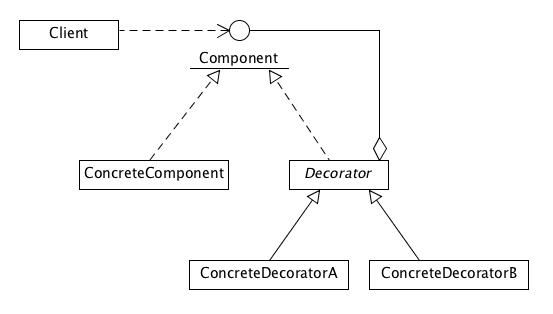
装饰模式(Decorator)定义:指在不改变现有对象结构的情况下,动态地给该对象增加一些职责(即增加其额外功能)的模式。
这里的“不改变现有对象结构”主要是只“使用的是同一个对象”。
装饰模式的优点有:
1、采用装饰模式扩展对象的功能比采用继承方式更加灵活。
2、可以设计出多个不同的具体装饰类,创造出多个不同行为的组合。
原始组件:
1 public interface Component { 2 public void Operation(); 3 } 4 5 public class ConcreteComponent implements Component { 6 @Override 7 public void Operation() { 8 // TODO Auto-generated method stub 9 System.out.println("原件调用"); 10 } 11 }
装饰者:
1 public abstract class Decorator implements Component { 2 private Component component; 3 4 public Decorator(Component component) { 5 this.component = component; 6 } 7 8 public void Operation() { 9 component.Operation(); 10 } 11 } 12 13 public class ConcreteDecoratorA extends Decorator { 14 public ConcreteDecoratorA(Component component) { 15 super(component); 16 // TODO Auto-generated constructor stub 17 } 18 19 public void Operation() { 20 super.Operation(); 21 addedFunction(); 22 } 23 24 public void addedFunction() { 25 System.out.println("添加具体装饰A"); 26 } 27 } 28 29 public class ConcreteDecoratorB extends Decorator { 30 public ConcreteDecoratorB(Component component) { 31 super(component); 32 // TODO Auto-generated constructor stub 33 } 34 35 public void Operation() { 36 super.Operation(); 37 addedFunction(); 38 } 39 40 public void addedFunction() { 41 System.out.println("添加具体装饰B"); 42 } 43 }
调用方式:
1 public class Client { 2 public static void main(String[] args) { 3 //声明组件的对象p,在下面对p进行进一步的"完善"但是不更换p的类型。 4 Component p = new ConcreteComponent(); 5 6 //未添加装饰的调用 7 p.Operation(); 8 9 System.out.println("----------------------"); 10 //添加具体装饰A 11 p = new ConcreteDecoratorA(p); 12 p.Operation(); 13 14 System.out.println("----------------------"); 15 //在装饰A的基础上,再添加具体装饰B 16 p = new ConcreteDecoratorB(p); 17 p.Operation(); 18 } 19 }
执行结果:

在调用方式中可以看到,始终使用的是Component p对象,将这个对象传入Decorator的实现类中,完成对这个对象的“装饰”。